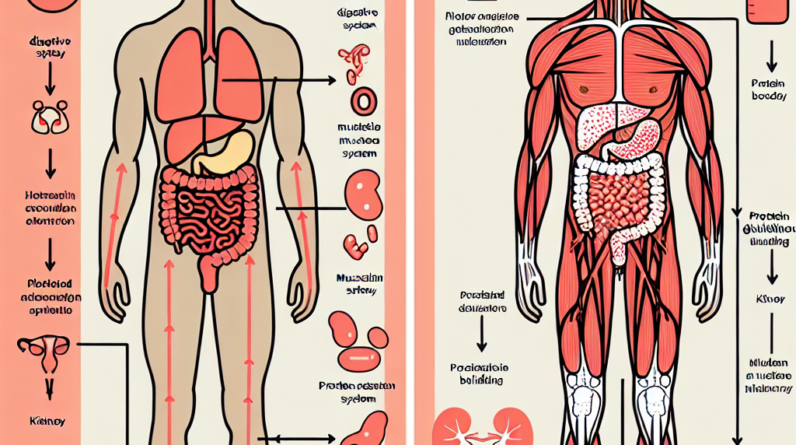
1. Improved Muscle Mass
Understanding Muscle Protein Synthesis
When I first started upping my protein intake, I was fascinated to learn about muscle protein synthesis. It’s this magical process where your body repairs and grows muscle fibers after you’ve worked out. Think of it like patching up a hole in your favorite jeans but with muscle. So, if you’re hitting the gym regularly, eating enough protein is crucial.
Get a Huge Discount and Bonus! Try for 90 Days Risk Free
As a personal trainer, I can’t stress how vital it is for muscle growth. It’s like giving your body the building blocks it needs to gain strength and size. This isn’t just about looking good; it’s about functional strength for daily activities too.
Moreover, it’s important to spread your protein intake throughout the day. This keeps the protein synthesis process constant, ensuring you’re always building muscle, not just repairing it. I remember the first time I did this, and the gains were notable—I felt like a superhero!
Feeling Stronger and More Energized
After increasing my protein intake, there was definitely a noticeable difference in my energy levels. I went from feeling fatigued post-workout to energized and ready to tackle more challenges. The extra protein seemed to fuel my workouts and daily tasks.
With higher energy levels, my workout performance improved. I could do more reps and lift heavier weights. Plus, this newfound strength translated into my everyday life, making things like carrying groceries or playing sports way more enjoyable.
It’s kind of surprising how much of a difference it made. A good protein-rich meal before heading to the gym can really be a game changer. I started playing around with different sources of protein to see what made me feel the best, and it turned into a fun little experiment!
Recovery Times are Shorter
Another perk of eating more protein is the quicker recovery time. Gone are the days of feeling sore for a week after leg day! With a proper protein intake, I noticed I could bounce back faster and hit the gym again without that dreaded heaviness.
This is a big deal for anyone trying to make consistent progress. Being able to work out more frequently really helped me break through some of my fitness plateaus. If I had known how big of a difference it would make, I would’ve started adjusting my diet earlier!
It also means I can put in that hard work without feeling like a zombie for days afterward. Trust me, feeling good enough to get back in the gym sooner is a win in my book!
Get a Huge Discount and Bonus! Try for 90 Days Risk Free
2. Enhanced Weight Management
Feeling Full Longer
One thing I seriously appreciate about protein is its ability to keep me full. When I started incorporating more protein into my meals, I found that I was snacking less between meals. This has been a game-changer for those late-night cravings!
From personal experience, having a high-protein breakfast keeps me satisfied way longer than a sugary cereal ever could. It’s like my stomach’s personal security guard. The longer I can stay full, the less tempted I feel to reach for those less healthy snacks.
This aspect alone has made a big difference in helping me manage my weight. By prioritizing protein, I’m not just eating less; I’m also making healthier choices throughout the day!
Muscle vs. Fat Loss
Another fascinating thing about increasing my protein intake is that it seems to favor muscle retention while encouraging fat loss. When you’re trying to lose weight, especially in the form of fat, it’s crucial to maintain as much muscle as possible. This helps keep your metabolic rate up, which I’ve found invaluable for weight management.
Need a Serious Energy BOOST? Huge Discount Try for 90 Days Risk Free
I used to think I could just cut calories dramatically to lose weight, but that only led to losing energy and feeling sluggish. Once I figured out that prioritizing protein helped maintain my muscle, everything turned around. I felt leaner and stronger.
Plus, feeling good in your skin makes a huge difference to your overall confidence and wellness. Everyone deserves to feel that way, right?
Understanding Protein Timing
Timing your protein intake is just as important as the amount. I learned that distributing protein throughout the day can have profound effects on muscle retention and fat loss. So now I’m all about that meal prep life! I even set reminders to ensure I’m consuming protein at every meal.
Combining protein with carbohydrates post-workout has also been effective for me. It’s like giving my body a reward for all its hard work. I celebrate every workout by nourishing my body with the right fuel!
No more guessing games here. If you’re trying to lose weight while keeping muscle, make protein timing a priority—it’s truly a simple yet powerful tool!
3. Boosted Metabolism
The Thermic Effect of Food
Did you know that eating protein can actually help boost your metabolism? This phenomenon is called the thermic effect of food (TEF). When I learned about this, I was blown away. Basically, digesting protein requires more energy than fats or carbohydrates, which means my body works harder when I eat protein-rich foods.
I found it exciting to think that my meals could contribute to my overall calorie-burning potential. It’s like getting a workout without even being at the gym! What I like to do is pair protein with fiber to maximize this effect, making it a power duo in my diet.
Understanding this concept really helped shift my mindset about meals. Rather than seeing them just as sources of energy, I began to view food as an essential part of my metabolism—an ally in my quest to feel my best!
Increased Energy Expenditure
With that boost in metabolism, I also noticed that I had more energy throughout the day. Feeling more energetic means I can stay active and engaged rather than feeling like a couch potato. It’s fascinating how what you feed your body can shape your day-to-day experiences.
Incorporating higher protein meals allowed me to maintain my energy levels, especially during those afternoon slumps. Instead of reaching for that sugary snack, I could grab a protein bar or some Greek yogurt, which kept my energy levels stabilized.
This means I can enjoy life more, whether that’s going for a run, playing with my kids, or just feeling alert throughout my workday.
Long-term Weight Loss Success
One of the most reassuring aspects of increasing my protein intake is that it promotes long-term weight loss. Unlike quick fixes, higher protein diets are sustainable. As I mentioned earlier, the fullness protein provides means I’m less likely to overeat.
Good Health Solution is Easier Than Most People Think!
Take a Look for Yourself!
It’s all about building healthy habits that can last a lifetime. Higher protein intake has helped me maintain my weight over the years, rather than bouncing back and forth like a yoyo. I genuinely feel like I am equipping myself with the right tools for success.
Plus, as I’ve seen, the steadier my blood sugar levels are, the more balanced my body feels overall. There’s nothing worse than those sugar crashes, right? Focusing on fueling my body with protein has been a game changer!
4. Improved Hormonal Balance
Protein and Hunger Hormones
Here’s another surprise: eating more protein can really help balance your hunger hormones, like ghrelin (the hunger hormone) and leptin (the satiety hormone). I noticed that when my protein intake was higher, my cravings significantly dropped, making it easier to resist unhealthy snacks.
Getting into the science of it is truly enlightening. Increased protein levels help regulate these hormones, thus helping stave off those pesky cravings. This was a revelation for me; I used to think willpower was all it took!
Understanding this helped me to make better choices. When I’d experience food cravings, now I knew that focusing on protein could help calm my body’s responses. It’s like having a secret weapon in my back pocket against hunger!
Impact on Mood and Energy Levels
It’s not just about the physical aspect; I’ve also found that maintaining stable protein levels positively affects my mood. There’s research suggesting that protein impacts the production of neurotransmitters, which play a huge role in how we feel.
With more stable moods, I’m better equipped to handle daily stressors. Training my body to find that balance through diet has led to more happiness when I look in the mirror. Taking the time to improve my hormonal balance through nutrition has been empowering!
My experience has taught me that taking care of my body translates directly into how I feel in my everyday life. Investing in a high-protein diet has undoubtedly lifted my spirits!
Beneficial for Women’s Hormonal Health
For women, hitting the right protein balance can also help with menstrual health. Personally, I’ve found that higher protein intake seems to smooth out those pesky hormonal fluctuations throughout my monthly cycle.
When I prioritize keeping my protein levels stable, I can mitigate many of the undesirable effects, from mood swings to bloating. It’s all about giving my body the support it needs during those times.
While everyone’s body is different, I’ve seen firsthand how making protein a priority has led to a calmer, more predictable cycle—and I’m all for it!
5. Strengthened Immune System
Protein’s Role in Immune Health
Did you know that protein plays a vital role in supporting your immune system? Seriously, it’s like sending in reinforcements to help fight off all those bugs and germs we encounter every day. I learned that amino acids, the building blocks of protein, are critical for the production of antibodies and other immune system components.
When I made a conscious effort to incorporate more protein, I noticed fewer times spent feeling under the weather. It’s a fantastic feeling knowing I’m not just nourishing my body for muscle gains, but also keeping my immune system strong!
This awareness shifted my thinking entirely. I’m now more mindful about getting enough protein, especially during cold and flu season. I truly believe that what I’m eating directly impacts how I feel and my overall resilience.
Energy to Fight Off Illness
Beyond just immunity, I’ve also found that having adequate protein levels gives my body the energy it needs to combat illness. When I’m feeling unwell, the last thing I want is to feel more drained. A well-balanced diet focused on a healthy protein intake can help me navigate through sickness more easily.
It’s like arming myself with the right armor. Staying proactive in my diet has helped me bounce back quicker, and I’m sure protein plays a big part in that! My body feels more equipped to handle whatever life throws at me.
Plus, the peace of mind from knowing I’m doing my part to support my health is incredibly satisfying.
The Connection Between Gut Health and Immunity
Lastly, let’s not overlook gut health! I’ve discovered that a healthy gut can help enhance immune function. Consistently consuming protein-rich foods can also aid in supporting gut microbiota, which is super important for our immune responses.
Integrating protein-rich foods along with fiber can create the perfect diet to support both my gut and immune health. If I can keep my gut happy, it seems my whole body tends to follow suit!
Focusing on gut health has been a journey for me, and I’m always learning. But now that I understand the connection between protein, gut health, and immunity, I feel empowered in my choices!
FAQ
1. How much protein should I be consuming daily?
The general recommendation is about 0.8 grams of protein per kilogram of body weight, but this amount can vary based on activity level, age, and fitness goals. Athletes or more active individuals typically need more, around 1.2 to 2.0 grams per kilogram.
2. Can eating too much protein be harmful?
In general, most people can handle a high protein intake without issues. However, if you have existing kidney problems or other health concerns, it’s essential to consult a healthcare provider before significantly increasing your protein intake.
3. Is it better to get protein from animal or plant sources?
Both animal and plant sources have their benefits! Animal proteins tend to be complete proteins (containing all essential amino acids), while most plant proteins are incomplete. However, combining different plant sources can give you all the essential amino acids as well.
4. What are some high-protein foods I can try?
Some great high-protein foods include chicken breast, fish, eggs, Greek yogurt, lentils, quinoa, nuts, and seeds. It’s fun to experiment with different foods and find out what works best for you!
5. How can I increase my protein intake in simple ways?
Start by adding protein to each meal. Incorporate snacks like nuts or protein bars, try Greek yogurt for breakfast, or add legumes to salads and stews. Meal prepping can also help make protein-rich meals handy for busy days!








